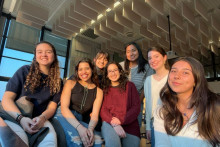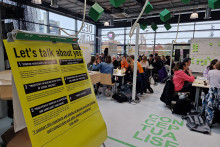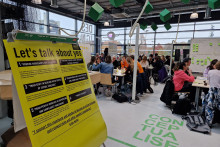According to an Amnesty report that came out last year, 11 percent of students got raped during their study time. With the campaign, called Let’s Talk About Yes, Amnesty also wants to reduce sexual violence at the UT. Alexandra Mulder, campaign manager of the student group at the UT says that it is necessary to promote this campaign at universities. ‘I was born in Chile and when I came to the Netherlands, I would expect the situation around sexual violence to be much better, since I moved to a Western European country. But it appeared to be much worse.’
Yara Mostafa, also a member of the Amnesty group at the UT, adds that the situation is especially worrying in the age group of students. ‘It is the age when people start living on their own and explore sexuality. It is important to raise awareness, since sexual violence seems to be a taboo topic sometimes, although research has shown that it is a prevalent topic.’
Manifesto
Since June 2021, the Let’s Talk About Yes campaign focuses on universities, with Amnesty trying to implement a manifesto that ensures better protection of students. At the UT, the manifesto is not signed yet, in contrast to some other Dutch universities. The manifesto covers six action points and at UT the Amnesty student group tries to implement all of them. ‘We have monthly meetings with the Student Union, the Diversity and Inclusion office and Student Affairs Coaching & Counselling, to talk about the campaign and the action points of the manifesto. At the UT, they are keen on solving all the action points, but they want to implement all of them first before signing the manifesto’, says Mulder.
The Executive Board sees the manifesto as part of a longer lasting approach for the coming three years, responds spokesperson Bertyl Lankhaar. ‘We are currently working on a campaign on social safety that will start before summer. Safety, sex and mutual agreement are an important part of it. By signing the manifesto as part of this campaign, the UT can show that safety is taken serious on campus.’
Action points
The first action point of Amnesty’s manifesto focuses on the provision of, for instance, bystander workshops that ensure the reduction of sexual violence. According to Lankhaar, the Student Union has already started active bystander trainings for all bar staff of study- and student associations. ‘The next step should be to let every member of these associations follow these trainings’, she says.
The second and third action point aim to inform students about support services and train staff in dealing with topics of sexual violence. ‘Currently, the website of UT is like a maze which makes it hard to find support services. Also, the topic is not included during the Kick-In yet, but it definitely should’, says Mulder, who has encountered uncomfortable situations during the Kick-In herself.
‘Confidential advisors are trained in dealing with the topic, but study advisors are not’, adds Mostafa. ‘Workshops about diversity, equity and inclusion are still optional, but should become mandatory for staff.’ The fourth point aims to provide a clear and transparent reporting procedure, while the fifth tries to make sure that the reporting procedure is trauma sensitive by training the involved parties to act the right way without perpetuating myths about rape. The sixth and final action point aims to involve students into the implementation of the manifesto.
Culture
When is the campaign considered a success for the local Amnesty student group? According to Mulder, the campaign is about changing the culture around sex at UT. ‘The manifesto focuses a lot on policy and the right support system, but it also talks a lot about consent culture and how we view sex among students. Rape happens to one in ten students, but ten out of ten women experience microaggression like sexual harassment, comments, jokes, or catcalling. It is a success when everyone is actively involved into making sex a safer, healthier, and more pleasurable thing for all. Especially for women, who are the primary victims of sexual violence.’








